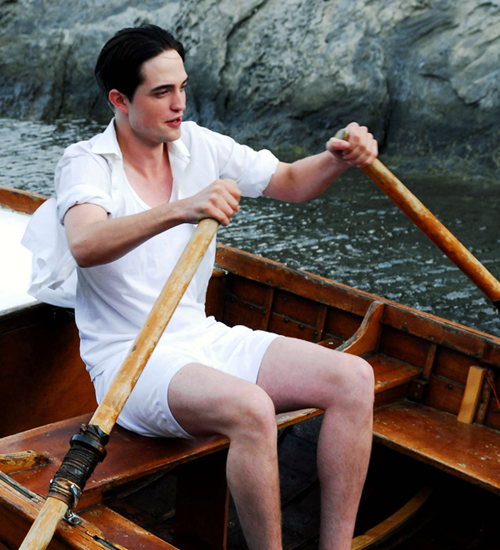|
Reviews of Recent Independent, Foreign, & Documentary Films in Theaters and DVD/Home Video
LITTLE ASHES In 1920’s Madrid, an entomologist and aspiring filmmaker, Luis Buñuel (Matthew McNulty), meets a young poet, Federico García Lorca (Javier Beltrán), at university. Then walks in an awkward, pasty-faced kid named Salvador Dalí (Pattinson). Buñuel, Lorca, and Dalí form an unlikely trio, hanging out around bars, Buñuel espousing his ideas on the bourgeoisie, and Lorca delivering the occasional poetic line. (The looks exchanged between Federico and Salvador are more than just friendly glances.) They are a tight-knit group until Buñuel leaves for Paris, with Dalí following soon afterward, departing from the rising fascist tide in Spain. What Little Ashes means to be is a love story, an awkward love story because of the disposition of Mr. Dalí. He wasn’t comfortable around people until he found his niche—as a deranged surrealist who held up anarchy as his mantra, and at one point, tells off the faculty at his final exam just for the hell of it. At an affluent dinner party, Dalí breaks the boundaries of acceptable behavior and speech, fidgeting with an oddball facial expression and uttering foul (though truthful) language. Dalí becomes, in his own mind at least, the greatest and most original artist of his time. Unfortunately, the filmmakers, instead of challenging conventions much like their own subjects, stick to the formula of a traditional biopic, making the characters at most two-dimensional, if not less. (Buñuel, particularly, comes off as an egotistical blowhard who gives his friends a hard time every chance he gets.) The script whittles down the romance of Lorca and Dalí to that of a bad soap opera, with the tropes of accusations and cheesy dialog. The one exception is a weirdly erotic sex scene where Lorca is seduced by a female friend while Dalí is crouched on the other side of the room, doing more than observing. Director Paul Morrison also dilutes some aspects of the film that could have been more captivating. For example, Lorca recites his poetry in Spanish, though the rest of the film is in English. But then this recitation, beautifully spoken by the actor, is drowned out inexplicably with his English voiceover. It’s awkward hearing the English translation not spoken with the same lyricism as in the original language, especially when subtitles would have sufficed. It further doesn’t help that there is only one visually riveting sequence—a dizzying, black-and-white montage of Buñuel’s first trip to Paris with Dalí. The rest of the film is directed with a bland eye and ear. The acting is mostly a downer, too,
as Beltran and McNulty don’t provide much in the way of compelling emotion
past what the simplistic script requires. Yet there is a saving grace in
an unlikely, amazing performance. Pattinson, who recently shot to fame
playing the heartthrob in Twilight, has a perfectly bizarre
physical presence. He doesn’t get Dalí’s voice quite right—he sounds
like an Englishman imitating an off-key Spaniard—but he soon transforms
into the iconic Dalí with the curvy moustache. Pattinson lights the
movie up throughout and should give a strange thrill to those teenage
girls who only know him as Twilight’s Edward. For everyone else, it could be considered a near breakthrough performance.
Jack Gattanella
|


